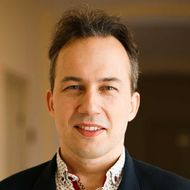Ruthenium Complexes Can Accelerate the Development of New Medicines

A group of scientists at INEOS RAS, HSE University, and MIPT have synthesised catalysts containing a ruthenium atom and an aromatic ring. The scientists have isolated the mirror forms of these catalysts and investigated their effectiveness in producing heterocycles, which are commonly found in the structures of drugs. The research findings have been published in Chemical Communications.
Isoquinoline derivatives exhibit high biological activity and are widely used as medicines such as diuretics, antibacterials, and antioxidants. One of the key stages in the synthesis of these substances is the activation of carbon-hydrogen bonds in the initial reagents. Typically, this stage must be conducted using catalysts that contain metal atoms.
Palladium compounds are most often used for such syntheses and can rightfully be considered leaders in the number of reactions they accelerate. However, they are not universally applicable. In 1993, a paper by Japanese scientists was published in Nature that described, for the first time, the carbon–hydrogen bond activation using a ruthenium catalyst. Over the last decade, the potential of these reactions has captivated scientists worldwide, with more than 300 papers published on this topic annually.
A group of Russian scientists at the A.N. Nesmeyanov Institute of Organoelement Compounds of the Russian Academy of Sciences, HSE University, and MIPT has extensive experience working with ruthenium compounds. Thus, in 2022, they obtained a ruthenium complex with an aromatic derivative of natural camphor, but it proved to be ineffective in catalysis. This year, they modified the structure of the compound to make the metal atom more accessible to reagents. A derivative of tetralin, an oil refining product, was chosen as the aromatic ring for binding ruthenium.
The resulting catalyst was separated into two enantiomers. Enantiomers are substances with the same chemical composition but different structures, similar to an object and its mirror image. The scientists used chromatography to separate the enantiomers. This process can be compared to the absorption of liquid by a sponge, where a specially selected compound acts as the sponge, absorbing the enantiomers at different rates.
'We aimed to make the synthesis as brief and straightforward as possible so that other scientists could easily use this method,' explains Dmitry Perekalin, Professor at the Joint Department of Organoelement Chemistry with the INEOS RAS, HSE Faculty of Chemistry, and Head of the Laboratory of Functional Organoelement Compounds at INEOS RAS.
The scientists used the obtained catalyst enantiomers to activate the bonds in benzamide and subsequently complete the cyclic structure of dihydroisoquinoline. The yield of the target substances was between 50% and 80%. According to the authors, the method they have developed can be used for the synthesis of other chiral catalysts, and research in this direction will continue.
The study was supported by the Russian Science Foundation, Grant 23-13-00345.
See also:
HSE Scientists Develop Application for Diagnosing Aphasia
Specialists at the HSE Centre for Language and Brain have developed an application for diagnosing language disorders (aphasia), which can result from head injuries, strokes, or other neurological conditions. AutoRAT is the first standardised digital tool in Russia for assessing the presence and severity of language disorders. The application is available on RuStore and can be used on mobile and tablet devices running the Android operating system.
HSE Researchers Discover Simple and Reliable Way to Understand How People Perceive Taste
A team of scientists from the HSE Centre for Cognition & Decision Making has studied how food flavours affect brain activity, facial muscles, and emotions. Using near-infrared spectroscopy (fNIRS), they demonstrated that pleasant food activates brain areas associated with positive emotions, while neutral food stimulates regions linked to negative emotions and avoidance. This approach offers a simpler way to predict the market success of products and study eating disorders. The study was published in the journal Food Quality and Preference.
Russian Scientists Demonstrate How Disorder Contributes to Emergence of Unusual Superconductivity
Researchers at HSE University and MIPT have investigated how the composition of electrons in a superconductor influences the emergence of intertype superconductivity—a unique state in which superconductors display unusual properties. It was previously believed that intertype superconductivity occurs only in materials with minimal impurities. However, the scientists discovered that the region of intertype superconductivity not only persists but can also expand in materials with a high concentration of impurities and defects. In the future, these superconductors could contribute to the development of highly sensitive sensors and detectors. The study has been published in Frontiers of Physics.
HSE Scientists Take Important Step Forward in Development of 6G Communication Technologies
Researchers at HSE MIEM have successfully demonstrated the effective operation of a 6G wireless communication channel at sub-THz frequencies. The device transmits data at 12 Gbps and maintains signal stability by automatically switching when blocked. These metrics comply with international 6G standards. An article published on arXiv, an open-access electronic repository, provides a description of certain elements of the system.
AI vs AI: Scientists Develop Neural Networks to Detect Generated Text Insertions
A research team, including Alexander Shirnin from HSE University, has developed two models designed to detect AI-generated insertions in scientific texts. The AIpom system integrates two types of models: a decoder and an encoder. The Papilusion system is designed to detect modifications through synonyms and summarisation by neural networks, using one type of models: encoders. In the future, these models will assist in verifying the originality and credibility of scientific publications. Articles describing the Papilusion and AIpom systems have been published in the ACL Anthology Digital Archive.
Acoustic Battles for the Harem: How the Calls of Siberian Wapiti Reveal Their Status and Individuality
Researchers at HSE University, Lomonosov Moscow State University, and the A.N. Severtsov Institute of Ecology and Evolution of the Russian Academy of Sciences have studied the distinctive vocalisations of Siberian wapiti (Cervus canadensis sibiricus) stags during the peak of the mating season, when males produce rutting calls (bugles) to attract females (hinds) and deter rivals. The scientists have discovered how the acoustic parameters of these rutting calls reflect the stag's status—whether he currently holds a harem or is still attempting to acquire one—as well as his individual characteristics. The study has been published in Journal of Zoology.
Z-Flipons: How Specific DNA Regions Help Regulate Gene Function
Researchers at HSE University and InsideOutBio have applied machine learning to identify the location and functions of mirror-twisted DNA structures, known as Z-flipons, in human and mouse genomes. The scientists discovered which Z-DNA regions were conserved in both species throughout evolution and demonstrated for the first time that Z-DNA accelerates the process of creating RNA copies of genes. The findings will contribute to the development of new treatments for genetic diseases. The study has been published in Scientific Reports.
HSE Researchers Develop Python Library for Analysing Eye Movements
A research team at HSE University has developed EyeFeatures, a Python library for analysing and modelling eye movement data. This tool is designed to simplify the work of scientists and developers by enabling them to efficiently process complex data and create predictive models.
Scientists Identify Fifteen Key Motives Driving Human Behaviour
Researchers at HSE University and the London School of Hygiene and Tropical Medicine have identified 15 key motives that drive human behaviour. By analysing people's views, preferences, and actions through an evolutionary lens, they demonstrated how these motives intertwine to shape habits and interpersonal relationships. The findings have been published in Personality and Individual Differences.
HSE Neurolinguists Create Russian Adaptation of Classic Verbal Memory Test
Researchers at the HSE Centre for Language and Brain and Psychiatric Hospital No. 1 Named after N.A. Alexeev have developed a Russian-language adaptation of the Rey Auditory Verbal Learning Test. This classic neuropsychological test evaluates various aspects of auditory verbal memory in adults and is widely used in both clinical diagnostics and research. The study findings have been published in The Clinical Neuropsychologist.



